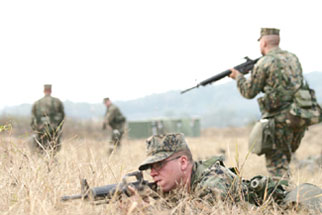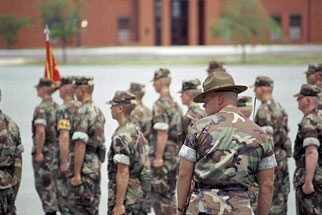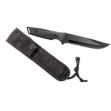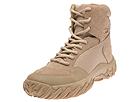
Marine Corps Basic Training is demanding. Prepare yourself for Boot Camp, mentally and physically.
Marine Corps Basic Training
Although the U.S. Marine Corps (USMC) may be the smallest service in the Department of Defense, it is by far the force that has taken many of the toughest missions the chain of command can throw at them. It’s for this reason that the Marines have evolved into a unique fighting force, with a military culture that thrives on overcoming monumental challenges and hardships.
This is why Marine boot camp, without a doubt, is the most rigorous and challenging, both physically and mentally, than basic training programs of all the other military branches. New recruits are also required to study and memorize an extreme amount of information, including:
- Basic drill and ceremony
- USMC Rank
- Eleven General Orders for a Sentry
- USMC Core Values
- Marine Rifle Creed
- Marine’s Hymn
- Marine Corp History
- M16A4 Rifle
- Code of Conduct
Recruit Receiving
Basic training lasts twelvelong weeks and is probably the most grueling period a recruit will ever face in their lifetime. The first few days, the recruit spends their time at Recruit Receiving. This is where they get their first military haircut and issued their initial gear, such as uniforms, letter writing supplies and toiletries. They’re also given a medical and must take a basic strength test, which consists of pull-ups and sit-ups and a half mile run, in order to gauge what shape they’re in. One thing the new recruit becomes aware of, is that the discipline begins the second they walk off the bus.
During receiving, new recruits will get a full dose of who their Marine Corp drill instructors (DIs) are, what they do and what they expect, which is usually expressed with lots and lots of yelling. Each platoon gets three DIs per platoon. The senior DI gives the majority of orders. The second DI specializes in singling out the recruits that don’t seem to be falling in line as easy as the rest and need extra tongue-lashings. The third DI usually administers the physical discipline, or what is called “quarter-decking.”
A typical day in the life of a recruit during Marine Corps Basic Training:
- First call (wake-up) — showering, shaving for males, certain morning tasks.
- PT (physical training).
- Morning chow
- Training
- Afternoon chow
- Training
- Evening chow
- Drill sergeant time — any subject the sergeants bring up.
- Personal time
- Lights-out
Physical Conditioning Platoon


New recruits will become quite familiar with the nuances of USMC protocol before they even enter into the building; how to conduct themselves, certain rules and codes to follow, how to address their DIs and what happens if they fail to follow these protocols. These are the absolute non-breakable rules that they will live by for the next thirteen weeks. During Receiving, if any recruit fails to perform the basic exercises during physical testing, the recruit will be required to spend a significant amount of time in Physical Conditioning Platoon (PCP). PCP is a grueling program focused on getting the recruit into optimal physical shape.
Forming is the next phase, where the recruits are taken to training companies and trained to follow everything “by the numbers” — eat, sleep, shower, line up, march, how to wear the uniform, how to secure their weapon, including any other simple task humans do in life. Ever single day, the recruits will be put through rigorous physical training or PT, which includes lots of physical exercises, running and long-distance marching. In addition to about eight hours of sleep, on a general basis, the recruit is allotted an hour of free time to read, write letters or take care of personal needs. No training or instructions by DI is given. During week one, the recruits will also attend various academic classes where they will field first aid, learn core values and spend time on basic weapon handling.
A few weeks in, the recruits will be introduced to close combat training, three mile marches with packs and the Confidence Course, where recruits participate in several obstacle course, each course more physically challenging than the last. The DIs will periodically inspect, evaluate, grade and compare the platoons and how they perform. Trophies will be initiated to the winning platoons, while the losing platoons will have to face the wrath of their respective DIs.
By week five, recruits will be put through Combat Water survival, which requires recruits to perform several basic water survival and swimming techniques in order to graduate from boot camp. There will also be a five mile hike test and a full-blown inspection. Recruits will also engage in Weapons Training and field firing, as well as training with explosives and other types of weapons. The Crucible is the final test that follows in the last weeks of boot camp. During the Crucible, recruits will be subject to direct “field training” and simulated war scenarios, food and sleep deprivation and forty mile marches.
Heroes of the Corps
The last week is spent learning the Heroes of the Corps, more core value classes and classes on financial management, graduation practice and finally graduation, where recruits finally become Marines. After ten days leave, Marines are then required to attend Marine Combat Training (MCT). After MCT, Marines further train at the School of Infantry. The Marines that specialize in infantry further their skills with advanced weapons and infantry training; all other Marines learn the particular trade they specialize in or that the USMC expects them to learn. After graduation from MOS, Marines will be assigned to their first permanent duty.
There are two locations in the U.S new recruits are sent to: Parris Island in South Carolina and San Diego in California. The recruits that enlist east of Mississippi will attend Parris Island; those to the west will attend San Diego. All women attend Parris Island. Other than geographical locations, the training is the same and there are no considerable differences other than the weather – but most salty veteran Marines will tell you that Parris Island is a more grueling challenge than the beaches of San Diego…
USMC Combat Gear
Joker One
Lieutenant Campbell takes this opportunity to provide the reader a front row seat into the daily struggles of his platoon. It would have been easy for him to shed the spotlight directly upon himself in this story; in order to boost his own ego. But to the contrary, Campbell highlights the extraordinary camaraderie of the men under his charge. Instead of highlighting his successes, he focuses on the successes of his men and points out his errors in judgment. He continually second guesses the split-second decisions he was forced to make. If only I had done X rather than Y, things might have been different; is the common theme of his thought process.
Joker One reads like an action packed Major Motion Picture. I had to constantly remind myself that I was reading a true story and not a piece of fiction dreamed up by some overly imaginative author hammering away at the keys of his or her word processor.
I do solemnly swear (or affirm) that I will support and defend the Constitution of the United States against all enemies foreign and domestic; that I will bear true faith and allegiance to the same. That I will obey the orders of the President of the United States and the orders of the officers appointed over me, according to regulations and the Uniform Code of Military Justice. So help me God.
Officer Candidate School | Military Flight School | Women in the Military | Military Aviation | Army Basic Training
















